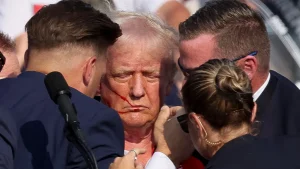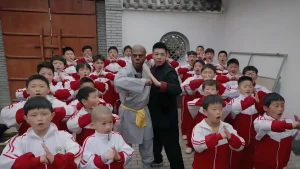Good for Trudeau, Free at Last from His Own Humiliation.
[This article is from China’s largest political website “guancha.cn”, written by the site’s columnist Wen Shaoqing]
As Trudeau’s term draws to a close, one cannot help but imagine a collective sigh of relief—not only from the weary Canadian public but perhaps even from Trudeau himself, as he finally frees himself from the endless humiliations he has caused.
“Neoliberal Icon”
For nearly a decade, Justin Trudeau has occupied Canada’s highest office not as a public servant but as if he were a crown prince.
Being the son of former Prime Minister Pierre Trudeau (who was in his first term when Justin was born and subsequently served three more terms), Justin was a celebrity since birth. His biographer Stephen Maher said that Justin’s family often referred to him as “the prince.” When discussing his political aspirations in his youth, Justin remarked, “I’ve always known that I could achieve this anytime I wanted.”
To launch his political career, he borrowed his father’s surname. In 2000, Trudeau’s eulogy at his father’s state funeral was widely praised and even prompted a flood of viewer calls to the Canadian Broadcasting Corporation demanding a rebroadcast. Seven years later, at the age of 36, Trudeau decided to run for parliament and narrowly won the following year. In April 2013, Trudeau was elected leader of the Liberal Party of Canada with 78% of the vote. In 2015, at the age of 44, he won the general election, becoming the 23rd Prime Minister of Canada.
“The name Justin certainly holds appeal, as it evokes nostalgia,” said seasoned pollster Darrell Bricker. “At the time, Canadian politics were turbulent, run by a bunch of old men, and even some young leaders felt old-fashioned, so Justin was like a breath of fresh air.”
Trudeau was not only a “prince” but also a “neoliberal icon.” A feminist, environmentalist, and advocate for refugees and Indigenous rights, he carried the same “change and hope” banner as Barack Obama. He introduced Canada’s first gender-equal cabinet and became famous for saying, “Because it’s 2015.”
He garnered fawning praise in mainstream media, with Vogue swooning over him and naming him one of the top ten “break-the-mold sexy guys” of 2015. A former European leader from the G7 stated that when meeting Trudeau, people queued up to take selfies with him, treating him like a rock star.
In 2016, as America shifted from the Obama era to the Trump era, Trudeau seemed to continue Obama’s political trajectory. In 2017, while Trump took a hard stance on immigration, Trudeau decided to open Canada’s doors to refugees—”For those fleeing persecution, terror, and war, Canadians will welcome you, regardless of your faith. Diversity is our strength.” After Trump issued the so-called “Muslim ban,” Trudeau even personally went to the airport to welcome Syrian refugees arriving in Canada. “His childlike charm and colorful socks blinded many,” commented the UK’s The Telegraph.
However, Trudeau’s “icon” image was always more about style than substance. Behind the carefully curated social media image and his famous socks was the destructive impact of neoliberal policies on Canada’s working and middle class. Real estate prices skyrocketed, making homeownership an unachievable dream for many young Canadians. Due to government economic policies favoring corporate interests, those struggling to make ends meet were neglected, further exacerbating wealth inequality.
In merely a decade, Canada’s federal debt doubled (rising from CAD 612 billion to CAD 1.2 trillion), nearly equating to the country’s total debt from 1867 to 2015. Homicide rates nearly doubled, overdose deaths skyrocketed fourfold, with an average of 21 Canadians dying from drug overdoses each day; military spending increased, yet troop size decreased, life expectancy stagnated, while legal cannabis sales soared—from CAD 240 million in 2016 to CAD 4.7 billion today, representing a staggering 1500% increase even when accounting for inflation.
No wonder, upon Trudeau’s resignation announcement, Musk commented instantly:
“2025 is truly great!”
“China’s Best Ally”
Once upon a time, Canada was one of the Western countries with the best relations with China. Pierre Trudeau was the first Canadian Prime Minister to visit the People’s Republic of China, meeting with Chairman Mao. When Justin Trudeau inherited his father’s cloak, Sino-Canadian relations in trade, culture, and diplomacy were flourishing. China became Canada’s largest trading partner after the United States, with high hopes for cooperative prospects.
However, during Justin Trudeau’s tenure, this favorable bilateral relationship gradually deteriorated into mutual suspicion and economic friction. Ottawa’s political stance and short-sighted foreign policy sacrificed what was once a promising partnership.
This was largely blamed on Trudeau’s subservience to the U.S. In December 2018, the arrest of Huawei CFO Meng Wanzhou became a turning point in Sino-Canadian relations. Acting on a U.S. extradition request, the Trudeau administration chose to detain Meng during her transit in Vancouver. This action, justified in the name of the rule of law, overlooked geopolitical impacts. For China, the response was swift and severe, exposing Canada’s vulnerability in major power competition and showing the world the cost of over-reliance on the U.S.
Facing the crisis, the Trudeau government appeared helpless. The incident’s impact went beyond the diplomatic sphere, affecting the economic domain. China imposed restrictions on major Canadian agricultural products like canola, pork, and soybeans, plunging industries heavily reliant on the Chinese market into disarray. Canadian farmers and businesses paid a heavy price for Trudeau’s short-sightedness.
Besides mishandling the Meng Wanzhou incident, the Trudeau government stumbled broadly in Sino-Canadian relations (for instance, publicly criticizing China on human rights issues). The Center for Strategic and International Studies commented, “Ottawa repeatedly positions itself as a passive agent bowing to U.S. priorities… Trudeau failed to develop a balanced and independent foreign policy, turning his government into a pawn in the China-U.S. confrontation. This servile pattern only exacerbates tension.”
The American magazine Foreign Policy also stated, “The erosion of trust between Canada and China carries significant long-term consequences. Canada lost opportunities to access key markets and weakened its influence in Asia-Pacific affairs. Trudeau showed dangerous moral posturing and geopolitical naivety in handling Sino-Canadian relations, undermining Canada’s national interests.”
The magazine continued, “The Meng Wanzhou incident will be remembered as a cautionary tale, showing that diplomatic policy should be strategically oriented rather than rooted in simple allegiance. Canada’s new chapter in global affairs must be written by leaders who understand that effective diplomacy is aimed at promoting national interests, not seeking ephemeral applause.”
Trudeau’s diplomatic naivety wasn’t limited to China. Around the same period, Canada’s relationship with India also sharply deteriorated, with exchanges as fierce, if not fiercer, than the Sino-Canadian situation. Trudeau once again exposed his posturing and lack of consideration, leading to a diplomatic disaster and causing Canada to lose face on the global stage. Americans again found themselves perplexed by their northern neighbor’s conduct: “Aside from the Canadian Prime Minister himself, no one knows his true motives,” stated the Washington Examiner regarding the Indo-Canadian diplomatic battle, “Clearly, China couldn’t ask for a better ally than Justin Trudeau.”
“The 51st State of America”
Trudeau’s obedience to the United States has earned Canada little respect. Not only did he fail to gain fair treatment, but he was repeatedly snubbed by U.S. leaders. From trade negotiations to international policy coordination, Canada under Trudeau’s leadership has consistently been seen as a “junior partner,” with his concessions earning only disdain and ridicule.
During the renegotiation of the North American Free Trade Agreement (NAFTA), Trudeau’s submissive stance was evident. Trump viewed negotiations as a zero-sum game, not only repeatedly insulting Canadian negotiators but also threatening to exclude Canada entirely.
To ensure the conclusion of the new agreement—the United States-Mexico-Canada Agreement (USMCA)—the Trudeau government ultimately accepted multiple terms unfavorable to the country, such as reducing export quotas for the dairy industry and limiting Canada’s ability to sign trade agreements with non-market economies independently. Even so, Trump did not miss the opportunity to publicly denigrate Trudeau at the 2018 G7 Summit, calling him “weak” and “dishonest.”
On the surface, with Joe Biden coming to power, given the shared values between the two countries, it seemed like Canada got a breather. However, reality proved otherwise. Biden announced the cancellation of the Keystone XL pipeline project as his government began, hitting directly at the heart of Canada’s energy industry, while Trudeau merely expressed acceptance.
Trade disputes further highlighted this situation. Trump’s tariffs on steel and aluminum under the guise of “national security” were a grave insult to one of America’s closest allies. While Trudeau imposed retaliatory tariffs in response, his rhetoric was so timid it bordered on obsequiousness. The U.S. tariffs lasted nearly a year before being lifted, with Canada gaining no substantial concessions.
Perhaps the most telling aspect is the condescending tone often employed by U.S. officials and media when discussing Trudeau personally. His emphasis on progressive politics and his carefully crafted public image made him a prime target. His vaunted “woke culture” political ideology, though popular in liberal circles, failed to earn America’s genuine respect, instead frequently becoming an object of mockery.
This again confirms that merely pandering to the United States cannot elevate Canada’s international standing. Even if you put your all for Uncle Sam, the “neighbor” won’t show mercy. Why else would Trump repeatedly address the country’s Prime Minister as “Governor”? As Canada’s Calgary Herald puts it, “It’s hard to imagine a greater insult.” On the international political stage, a self-deprecating country cannot earn global respect, a truth that is difficult to fathom that Justin Trudeau could not understand.
“Nowadays, Canada serves as a cautionary tale for the world, its international status so low that Donald Trump unabashedly suggested its incorporation into the United States. Whether in its failed economy, collapsing immigration system, or inhumane euthanasia regime, the term ‘Canada’ has become emblematic of a political era in the West, one that is nearing its end,” commented The Telegraph.
As this era nears its end, one question lingers: How could someone with only hotel security, ski instructor, third-rate actor, and high school teacher experiences—a rich heir with almost no governance experience—serve as Prime Minister of Canada for a decade?
This query, Foreign Policy has answered for us (those liberals hiding behind “at least the West allows criticism” can breathe a sigh of relief):
“The prolonged leadership of someone so privileged and mediocre inevitably raises profound questions about the health of Canada’s democratic system. Trudeau’s long tenure highlights systemic flaws wherein charisma and family legacy eclipse competence and accountability. It serves as a sobering reminder that when political drama is mistaken for genuine governance, the risks are significant.”
Editor: Zhongxiaowen



